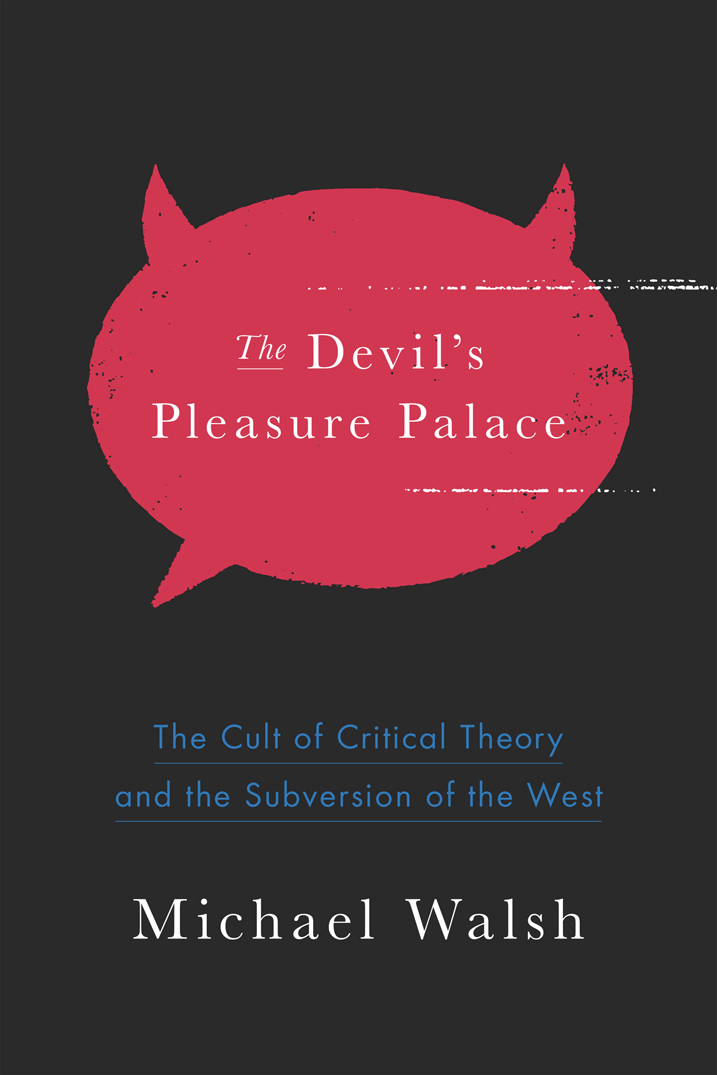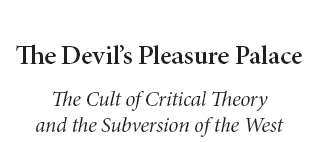The Devil's Pleasure Palace
Read The Devil's Pleasure Palace Online
Authors: Michael Walsh




© 2015 by Michael Walsh
All rights reserved. No part of this publication may be reproduced, stored in a retrieval system, or transmitted, in any form or by any means, electronic, mechanical, photocopying, recording, or otherwise, without the prior written permission of Encounter Books, 900 Broadway, Suite 601, New York, New York, 10003.
First American edition published in 2015 by Encounter Books, an activity of Encounter for Culture and Education, Inc., a nonprofit, tax exempt corporation.
Encounter Books website address:
www.encounterbooks.com
The paper used in this publication meets the minimum requirements of ANSI/NISO Z39.48â1992 (R 1997) (
Permanence of Paper
).
FIRST AMERICAN EDITION
Library of Congress Cataloging-in-Publication Data
Walsh, Michael, 1949â
The devil's pleasure palace : the cult of critical theory and the subversion of the West / by Michael Walsh.
pages cm
Includes bibliographical references and index.
ISBN 978-1-59403-769-6 (ebook)
1.
 Â
Critical theoryâUnited States. 2.
 Â
Nihilism (Philosophy) 3.
 Â
United StatesâCivilizationâ194â
 Â
I. Title.
HM480.W35 2015
149'.8âdc23
2015002549
For Ann Patricia Walsh, my mother, who taught me to love words
Philosophers have only interpreted the world in various ways; the point is to change it.
â Marx,
Theses on Feuerbach
But I can't listen to music often, it affects the nerves. One wants to say pleasant stupidities and stroke on the head the people who, living in this dirty hell, can create such beauty. And today it is impossible to stroke anyone on the headâthey bite off your hand, and it is necessary to beat heads, beat them ruthlessly, although we, ideally, are against any sort of violence against people. Hmmm, the task is diabolically difficult.
â Vladimir Lenin, as recounted by Maxim Gorky in
Days with Lenin
Only a humanity to which death has become as indifferent as its members, which has died to itself, can inflict it administratively on innumerable people.
â Theodor Adorno,
Minima Moralia: Reflections on a Damaged Life
You can discover what your enemy fears most by observing the means he uses to frighten you . . . Take away hatred from some people, and you have men without faith.
â Eric Hoffer,
The Passionate State of Mind
It is true that storytelling reveals meaning without committing the error of defining it, that it brings about consent and reconciliation with things as they really are, and that we may even trust it to contain eventually by implication that last word which we expect from the “Day of Judgment.”
â Hannah Arendt,
Men in Dark Times
At the core of liberalism is the spoiled childâmiserable, as all spoiled children are, unsatisfied, demanding, ill-disciplined, despotic, and useless. Liberalism is a philosophy of sniveling brats.
â P. J. O'Rourke,
Give War a Chance
The champions of socialism call themselves progressives, but they recommend a system which is characterized by rigid observance of routine and by a resistance to every kind of improvement. They call themselves liberals, but they are intent upon abolishing liberty. They call themselves democrats, but they yearn for dictatorship. They call themselves revolutionaries, but they want to make the government omnipotent. They promise the blessings of the Garden of Eden, but they plan to transform the world into a gigantic
post office. Every man but one a subordinate clerk in a bureau. What an alluring utopia! What a noble cause to fight for!
â Ludwig von Mises,
Bureaucracy
The crisis of the West consists in the West's having become uncertain of its purpose.
â Leo Strauss,
The City and Man
Contents
Introduction: Of the Devil's Pleasure Palace
Chapter Four: The Sleep of Pure Reason Produces Monsters
Chapter Five: The Descent into Hell
Chapter Six: The Eternal Feminine
Chapter Seven: Of Light and Darkness
Chapter Eight: Of Words and Music
Chapter Nine: The Venusberg of Death
Chapter Ten: World without God, Amen
Chapter Eleven: Of Eros and Thanatos
Chapter Twelve: The Consolation of Philosophy
Chapter Thirteen: Mephisto at the Ministry of Love
Chapter Fourteen: The Devil Is in the Details
Chapter Fifteen: Oikophobes and Xenophiles
Chapter Sixteen: Good-Bye to All That
I
n the aftermath of World War II, Americaâthe new leader of the Westâstood alone as the world's premier military power. Yet its martial confidence contrasted vividly with its sense of cultural inferiority. Still looking to a defeated and dispirited Europe for intellectual and artistic guidance, a burgeoning transnational elite in New York City and Washington, D.C., embraced not only the war's refugees but also many of their resolutely nineteenth-century “modern” ideas as well.
Few of these ideas have proven more pernicious than those of the so-called Frankfurt School and its reactionary philosophy of “critical theory.” At once overly intellectualized and emotionally juvenile, Critical Theoryâlike Pandora's Boxâreleased a horde of demons into the American psyche. When everything could be questioned, nothing could be real, and the muscular, confident empiricism that had just won the war gave way, in less than a generation, to a fashionable Central European nihilism that was celebrated on college campuses across the United States. Seizing the high ground of academe and the arts, the new nihilists set about dissolving the bedrock of the country, from patriotism to marriage to the family to military service. They have sown (as Cardinal Bergoglioânow Pope Francisâhas written of Satan, who will play a large role in our story) “destruction, division, hatred, and calumny”âand all disguised as a search for truth that will lead to human happiness here on earth.
Of course, what has resulted is something far from that. Were any of the originators of Critical Theory sill among us, they might well say, quoting Sir Christopher Wren:
Si monumentum requiris, circumspice
. Look about your daily lives here in early twenty-first-century America and Western Europe, and see the shabbiness, hear the coarseness of speech and dialogue, witness the lowered standards not only of personal behavior but also of cultural norms, savor the shrunken horizons of the future.
The Frankfurt School sucker punched American culture right in its weak solar plexus. Americans have always been sympathetic to an alternative point of view, sympathetic to the underdog, solicitous of strangers, especially foreign refugees fleeing a monster like Hitler. Largely innocent of the European battles over various forms of socialism, and softened up to a certain extent by the Roosevelt administration's early, frank admiration of Mussolini as it tried to solve the economic crisis of the Depression, the American public was open to self-criticism.
The problem with the Frankfurt School scholars was that they arrived with ideological blindersâmen of the Left fighting other men of the Left back in the old
Heimat
âand were unable to see that there was another, different world welcoming them in the United States if only they would open their eyes. (How, for example, could they hate California?) They appear not so much scholarly as simple, viewing American capitalism as a vast, deliberate, conspiracy against their own socialist ideas, when, in fact, their ideas were simply wrong, their analysis flawed, and their animus ineradicable. They were creatures of their own time and place, with no more claim to absolute truth than the man on a soapbox in Speakers' Corner in Hyde Park or the lunatic staggering down Market Street in San Francisco talking to himself. Everybody's got a beef.
One thing they did get right, though: Popular culture lay at the heart of the American experience. It was hugely influential in a way that surpassed the understanding of European academics; without official sanction, it spoke for the people in a way that state-sponsored Socialist Realist art never could. They knew pop culture was potent, very potent, but they had no idea how to create more of it, or control it. They were so obsessed with their crude and unsophisticated Marxism, so devoted to their paradigm of the class struggle, that they worried about pop culture's destructive top-down effect on the gullible proletariat and viewed
Hollywood and the mass media as, naturally, a capitalist plot to seduce the rubes. (Seduction, they believed, was their socialist birthright, not capitalism's.) They desired self-improving, consciousness-raising art to be a matter for the State, and they disdained the profit motive, though they certainly had no objection to making money. But their successors had no such quibbles with mass culture. They grasped that the “long march through the institutions” (as the Marxists characterized it) would be the ticket to ideological hegemony and even greater wealthâevolution, not revolution.